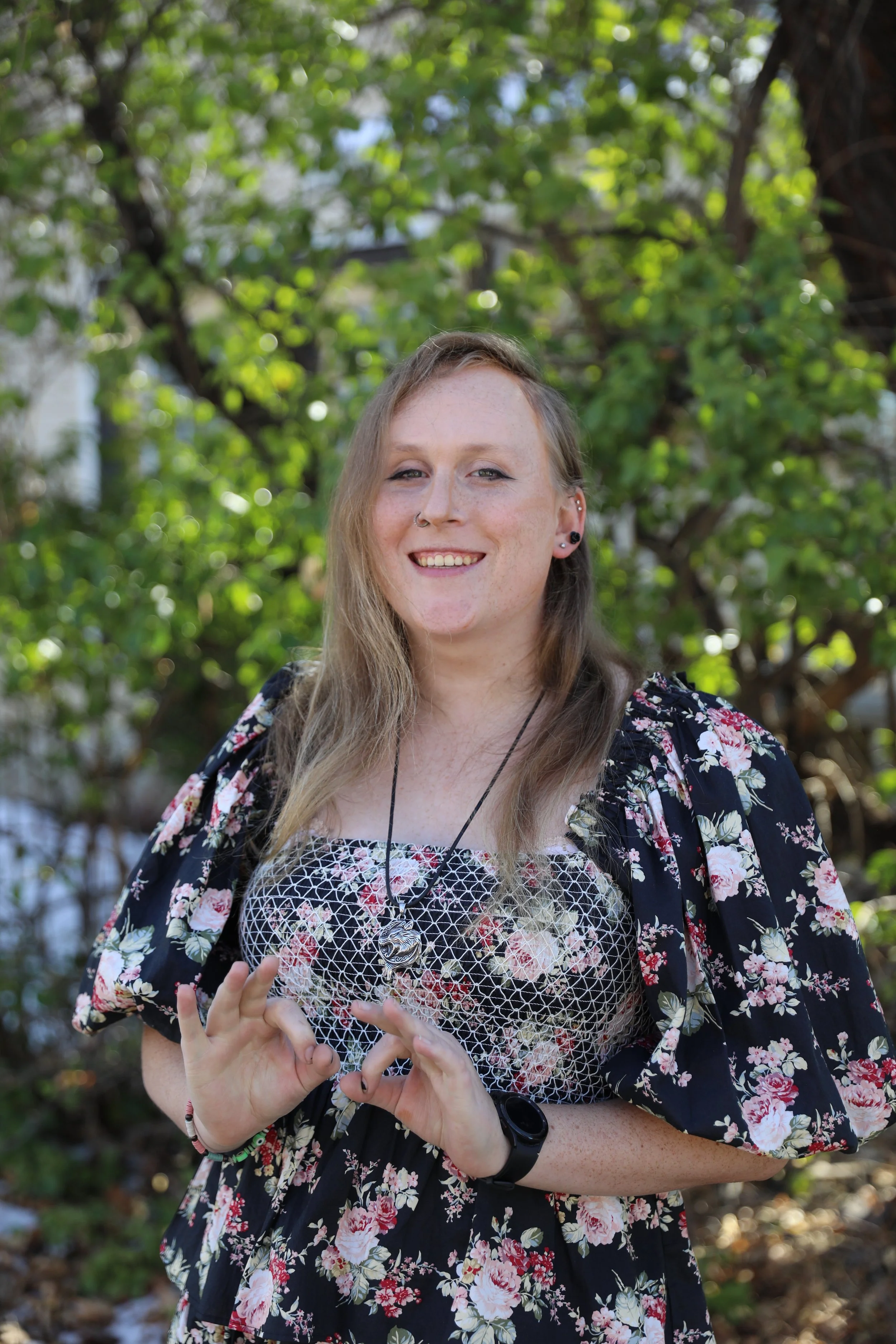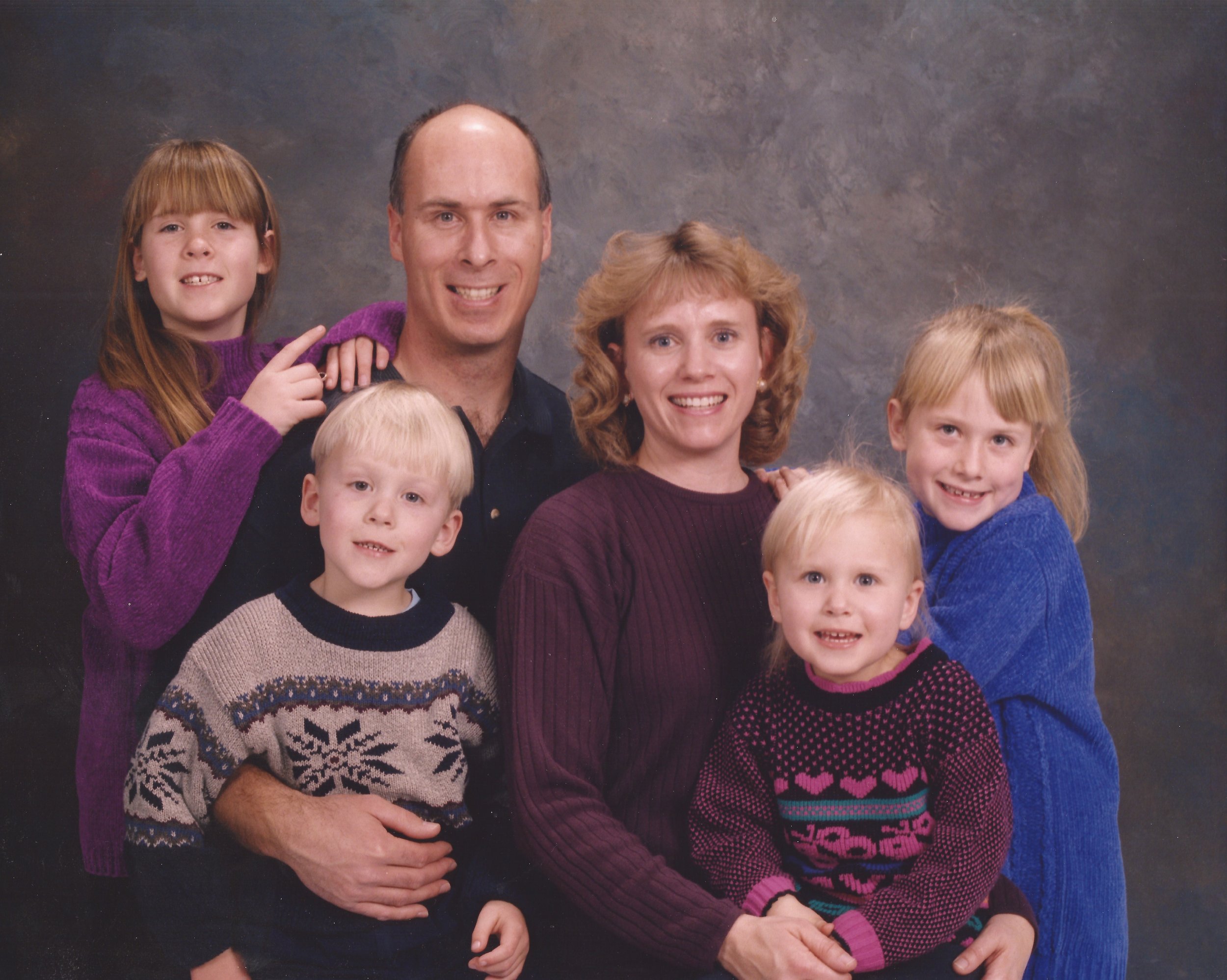JESSICA ANGUS
Jessica Angus (she/her) has had many lives in her 32 years: missionary, ranch hand, electrical engineering student, circuit board designer, ramen shop manager, educator, tutor, and tabletop game master. She is also a transgender woman—a journey she has approached through years of careful reflection, private exploration, and spiritual inquiry.
Growing up in Colorado, Jess was the third of four children and born and raised as the only boy in a family of girls. “When I was still a kid—I was ‘the boy,’ the only son,” she says. “Part of me feels like I took that from my parents, but I also found some joy in that when I came out.” While her sisters were close, she often felt left out. “Girls didn’t want to do ‘boy stuff’,” she remembers. But now they all get along well. “I love them—we communicate quite a bit.”
Her extended family is massive—her mom is one of ten siblings, and her dad is one of four. “Family reunions were huge,” Jessica says. “We’d do them all the time—my grandpa sold a business and would throw these big reunions every four years.” Jess was able to grow up knowing her extended family, some of whom have now become her closest friends.
As early as 10 years old, Jess began experiencing dysphoria, though she didn’t yet have the language for it. She’d sneak onto her my parents’ laptops, getting on the paint app and “draw on boobs” to her image, she laughs. By 12 or 14, her parents had discovered some of this behavior and labeled it “a sin” or “a fetish.” From that point on, Jessica tried to suppress everything, but it didn’t work. Rather, it only led to a path of depression—high functioning at first, then lower.
Her adolescence and young adulthood were marked by guilt and a sense of being spiritually flawed. “For 15 years, I thought what I was doing was bad—so I’d apologize to God, but always ended up slipping back into it,” she recalls. “I would buy feminine clothes on Amazon in secret. Feel guilty. Throw them in the trash. Repent. Repeat.”
College offered independence and a turning point. Jessica attended BYU and served a mission in southern Brazil—a pivotal experience. “It was the best experience of what it feels like to serve—how it feels when close to Heavenly Father,” she says. Her mission proved to be hugely important in her own journey, helping her recognize answers to questions.
The part of Brazil Jess was sent to was considered “the Texas of Brazil”—same climate, similar culture. All were religious but many didn’t attend. Jess recalls how they’d fly their state flag above the Brazilian one because they had tried to secede. “Think knives on hip, rancher, cowboy types,” Jess laughs.
She returned to BYU after her mission, where her depression increased. Five years into an electrical engineering degree, her grades slipped and attendance dropped. Eventually, her poor attendance record led to the university asking her to take a leave to address her mental health. She says the ask was beneficial because she was wasting money paying for semesters but not getting anything done. “It gave me the added kick to take care of my mental health—and led to my whole journey.”
Jessica stayed in Provo, drawn in by the eclectic local culture ad cheap rent. She began working a variety of jobs: sales rep, para-educator, IT support, hardware test engineer, professional tutor. Eventually, she took a job as a service manager at Asa Ramen. “They proclaim we’re ‘the best ramen shop in Utah’—I’d say we’re at least top five,” she laughs. Because she was eating there all the time, she decided to work there to eat for free. As a people person, she loves that she has a job that allows much human interaction.
Between shifts, Jessica programs video games and plays Dungeons and Dragons twice a week, where she’s a game master for one session. She also runs a tabletop RPG campaign where players try to build a new civilization. Of this hobby, Jess explains, “Tabletop role play games give options to create journeys for others to participate in. It’s collaborative storytelling—I think it’s awesome.”
Coming out and into her own was a slow process. As she got treatment for depression, she decided to examine where her feelings were coming from—were her inclinations to dress as a girl a sin or something else? As she’d wear the clothes she preferred, she says she was constantly praying to Heavenly Father, “Is this baby step ok? Am I good?” And as all felt ok, she’d check in at the next step.
She came out to her siblings starting at 25, then to her parents at 27. At first, she framed it as cross-dressing. She had posted a photo on Instagram of herself in a dress—ostensibly for a teaching challenge: “If you get this many people to go to prom, I’ll wear a dress.” But the reaction was intense. When she first came out, Jess’ dad said, “My son is dead,” and walked away from the phone, followed by her mom who said, “I don’t know what to say. I just don’t know…”
The call ended in devastation. “I thought, I don’t have parents anymore, this is terrible, because I wore a dress and was happy about it.” But later that same day, her parents called back. They’d gone to visit one of Jessica’s more understanding sisters, who encouraged them to express love and support. “They told me they were sorry and that I was still loved,” she said. “They expressed confusion, admitted they didn’t know how to work around it—but wanted me to know I was loved.”
That moment mattered. “Even if they’re not the most supportive in my journey, they’re still supportive of me and love me,” Jessica says. Her dad says, “I don’t know if I fully understand,” but he always asks, “Are you happy?” Jess says she feels that’s the most important question they ask of her—instead of imposing a path.
She began HRT in 2020. At first, she thought she’d be androgynous—purposefully cause a bit of chaos and confusion: “Are you a guy? A girl? But the further I went, the happier I felt—I wanted to go all the way to being female.”
Her favorite outfit now? Jess proudly laughs: Jorts and a baggy ACDC shirt. Pair of sandals.
Jessica now finds strength in a diverse network of friends and cousins, many of whom have stepped away from the church but continue to model love and morality. She says she’s been able to grow a lot through these relationships and says, “While many have left the Church, they have strengthened my belief in things the Church teaches—especially Christ.”
When Jessica legally changed her name, her friend group threw her a gender reveal party.
She’s also found spiritual grounding in her local ward. Her bishop supports her attendance in Relief Society and has tried to advocate for her amid evolving church policies. “He listens to my pains, worries—tries to find loopholes I can get through,” she said. “He says we’re going to try to ask for an exception and as there is still no guidance on how to do so, we’ll stick with status quo until we get a result.”
The Church’s recent policy on transgender members felt like a blow. “It was kind of a punch to the face,” she says. “Instead of making trans people feel invited, it tries to make other members feel protected from trans people. It wasn’t to make sure trans people aren’t discriminated against—but how to keep trans people in line.” She says the thing she’s always loved most about Christ and His gospel was how he “sat among sinners even though people thought it was impure for Him to teach them. It’s a Christlike activity to be with people we may not understand.”
For Jessica, the response revealed a deeper problem. “I feel anything made to make people not ask questions is alienating,” she said. “A lot of friends left the Church over new info for which they felt betrayed. I feel like we shouldn’t be hiding stuff and past things that were taught.” She says one of the worst wards she ever participated in was one where everyone tried to pretend they were perfect, where they’d talk about the law of Christ and say, “Isn’t it good we’re all doing this?” But she reflects how that ward felt like one in which no one could be honest or grow in their struggles.
Even so, she remains. “All the more reason I should stay—as long as I’m present and still seen, people in my local congregation will get to see, learn, grow.”
Recently, she completed a course on self-actualization that helped her reframe her relationship to church participation. “At first, maybe I was proud of being brave for being there for people who need to know a trans person’s experience,” she says. “But I stopped and reexamined—and went back to knowing I’m here for me, for Christ. Being there for others is a bonus.”
What keeps Jess grounded is a return to the core teachings of the gospel. “A lot of fluff has been added to things—but fluff changes,” she said. “During the priesthood ban… people came up with excuses, ‘doctrine’ why. At the end, all of it was not real. All excuses weren’t the case. But one part was always the case—the love of Christ, the gospel, coming to salvation through taking His name,” she continues. “All the covenants of sacrament, baptism. I cut the fluff and go back to the core of the gospel. For everything else—I seek out God myself.”
She adds with a smile: “I can have my own fluff—the fluff God wants for me.







